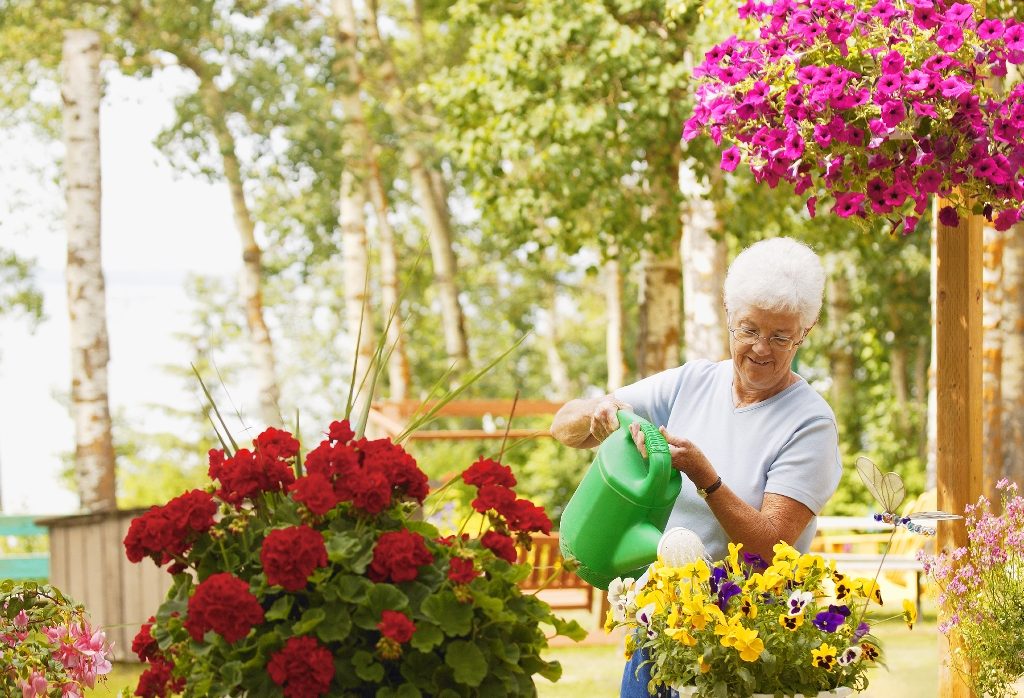
We spend a lot of time outdoors during the spring and summer seasons. While sunshine and fresh air are good for a person at any age, it’s important that seniors know how to stay safe while getting the benefits of the wonderful weather. Planning ahead is the best way you can help prevent emergencies before they happen. Here are five ways seniors can stay safe while still enjoying some beautiful, sunny days outside.
1. Avoid Heat Exhaustion
Heat exhaustion, also known as hyperthermia, is a potentially life-threatening condition that happens when your body’s core temperature rises several degrees higher than is normal. This can be due to exposure to hot temperatures outside and dehydration. If you notice that you or a loved one is experiencing any of the following symptoms, get them to a cool, shady place, and seek medical attention immediately:
- A body temperature at or above 104 degrees
- Dry, flushed skin
- Changes in behavior like confusion, agitation, or episodes of anger
- Headache
- Rapid pulse
- Heavy, labored breathing
- Inability to sweat even though very hot
- Nausea or vomiting
- Fainting
2. Protect Your Skin
Sunshine and the increase in active insects can be dangerous to your health, so take steps to protect your skin from what nature throws at it. Insects are more than just uninvited pests that show up at your backyard barbecue; their bites and stings can cause infections, diseases, and in some individuals, a severe allergic reaction called anaphylaxis. Find a bug spray or insect repellent that works best for you. If you have really sensitive skin, consider using area sprays, candles, and bug lights to cut down on pests.
Whenever you are going to be spending a long amount of time outside, make sure to wear sunscreen, even on cloudy days. Too much exposure to harmful UVA and UVB rays can lead to an increase in wrinkles, dark spots, and can even cause skin cancer. The Skin Cancer Foundation recommends that you buy and use a sunscreen that protects against both UVA and UVB rays and that has somewhere between 30-50 SPF protection. Anything lower or higher does not protect against both types of UV rays.
3. Dress Weather-Appropriate
Whenever it’s hot and sunny outside, wear loose-fitting clothing that’s designed to “breathe”. Wear white or very light colors, because light colors repel sunshine, while darker colors will soak it up, heating your body. Read more about proper sun protection clothing here. Wearing a large sunhat or baseball cap can help to protect your face and eyes and help prevent you from burning your scalp. Invest in a good pair of sunglasses that protect against both UVA and UVB rays.
4. Move Safely
It’s important to have a daily exercise routine in order to stay healthy. However, when we move around a lot in the heat and the humidity, our bodies tend to heat up much faster than they do in cooler conditions. If you’re going to be spending a considerable amount of time doing any sort of outdoor activity, be it gardening, walking, or swimming, you need to make sure you stay safe while doing it. Make sure you wear the proper clothing for the activity. Take several short breaks, and stay hydrated by drinking plenty of healthy liquids, like water, 100 percent juice, or milk. Track the time that you spend outside, and don’t stay out for extended periods. If at all possible, try to do outdoor activities in the early mornings or late evenings, when it is not as hot outside. Stay inside or in a shady, cool place during the hottest parts of the day.
5. Keep in Contact with Loved Ones
If you’re going to be spending any amount of time outside alone, even if it’s just a short trip into your front yard to pick some tomatoes, take a cell phone with you and make sure that your trusted family and friends know where you’re going to be and what you’re doing. Exposure to high temperatures can result in life-threatening conditions, like heat exhaustion or heat stroke. Get to know your neighbors and ask them to check on you throughout the day when it’s going to be especially hot and muggy out. Keep a list of emergency contacts with their names and phone numbers in an obvious location, like on your fridge or beside your home phone. In your cell phone, label all of your emergency contacts as “AA Emergency” followed by their name so that, in the event of an emergency, responding personnel will know who to contact (example: “AA Emergency Bob Smith”).


